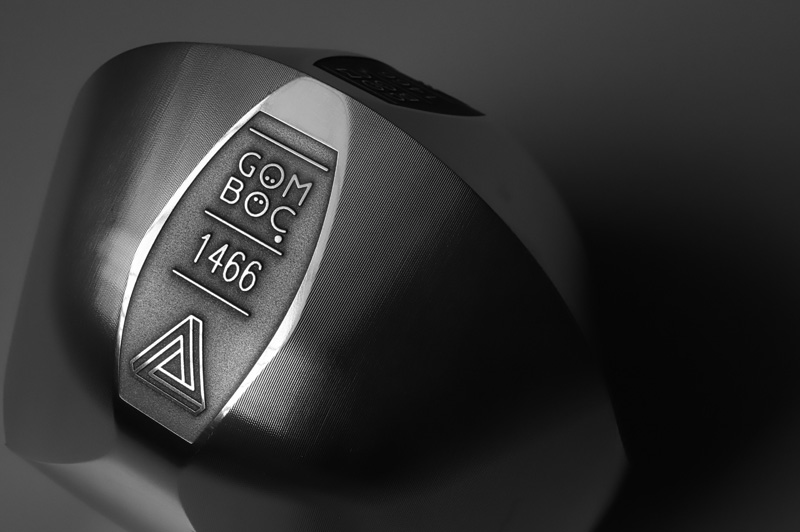GÖMBÖC 1466, COMPLEMENTING THE 2020 ERASMUS MEDAL OF Professor ROGER PENROSE#
As a compliment to the award of the 2020 Erasmus medal of the Academia Europaea, Professor Roger Penrose will also receive a unique GÖMBÖC piece.
These structures reflect Prof. Penrose’s passion for mathematical complexities. Each piece is unique and the GÖMBÖC piece numbered 1466 will be presented at an event to be arranged in Oxford, during September. This piece has been sponsored by Mr. Ottó Albrecht , Chairman of the Board bei Cashline Investments Holding Ltd.
, Chairman of the Board bei Cashline Investments Holding Ltd. .
.
1466, the number of the Roger Penrose GÖMÖC piece, is the year of birth of Erasmus of Rotterdam, the Dutch philosopher and Christian scholar after whom the Academia Europaea Erasmus award is named.
The AE is grateful to Professors Balazs Gulyas and Gabor Domokos who are orchestrators for this piece.
who are orchestrators for this piece.
View the presentation of the GÖMBÖC piece to Sir Roger Penrose by HE the Hungarian Ambassador.
to Sir Roger Penrose by HE the Hungarian Ambassador.
GÖMBÖC 1466, COMPLEMENTING THE 2020 ERASMUS MEDAL OF Professor ROGER PENROSE#
Academia Europeae has decided to complement the 2020 Erasmus medal of Roger Penrose with the individual Gömböc model 1466.
As several seminal contributions of Penrose are rooted in geometric intuition, a physical object highlighting the beauty of this type of intuition appeared to be an adequate idea. The work of Penrose shows how pure mathematics can bear fruits in a broad range of applications and the story of the Gömböc appears to evolve in the same spirit.
Definition of the Gömböc
The Gömböc is the first known example of a new class of shapes called mono-monostatic: convex, homogeneous bodies with just one stable and one unstable equilibrium point. The story and the people behind the Gömböc make it unique.
Origin of the Gömböc
In 1995, despite widespread common belief in the mathematical community that such shapes can not exist, Vladimir Igorevich Arnold offered a stunning conjecture to the contrary. Arnold’s geometric intuition proved to be correct: in 2007, Gábor Domokos and Péter Várkonyi from the Budapest University of Technology and Economics proved the conjecture and created the first phyiscal example which became known as the Gömböc.
Gömböc in Nature
Biological evolution developed a Gömböc-like shape: the shell of the Indian Star Tortoise, helping to self-right when turned upside down. Natural abraison decreases the number of static balance points, approaching the Gömböc as an unattainable goal. This theory not only helped an international team to prove ancient fluvial activity on Mars but also led to recognize a universal geometric frame to natural fragmentation, confirming Plato’ postulate identifying the element Earth with the cube.
Gömböc in Engineering
The GRASP Labs at Penn used the Gömböc shape for their super-stable drones, enabling spontaneous recovery from collisions. An MIT-Harvard team used the Gömböc to build an insuline capsule self-righting in the stomach and thus replacing injections. The world’s leading software to test and build the racing boats for America’s Cup has been christened „Gömböc”.
Gömböc in Arts
Works of conceptual artist Ryan Gander, painter Vivien Zhang, movie director Ulrike Vahl, choreographer Antonin Comestaz and novelist Dan Richards are testimonies how they were inspired by the Gömböc, which was on exhibit at the Shanghai World Expo in 2010 and also at Lisson Gallery, London in 2018.
Individual Gömböc Pieces
Individual Gömböc pieces carry a unique serial number between 1 and the current year, each number is produced only once. The manufacturing standards for individual Gömböc models are those of industrial art. As the shape has approximately 0.01% tolerance, individual engravings entail the production of individual manufacturing tools.
The first such model, Gömböc 001 was the inventor’s gift to Arnold on his 70th birthday, who later on donated it to the Steklov Institute. Subsequently, many prominent institutions worldwide decided to put individual Gömböc pieces on permanent exhibit. More info: https://bit.ly/2Qg59Er
Gömböc 1466 carries the year of birth of Desiderius Erasmus Roterodamus and, as an additional engraving, a Penrose Triangle.
The production of Gömböc 1466 was sponsored by Mr. Ottó Albrecht.
What is a GÖMBÖC? , Wikipedia
, Wikipedia



